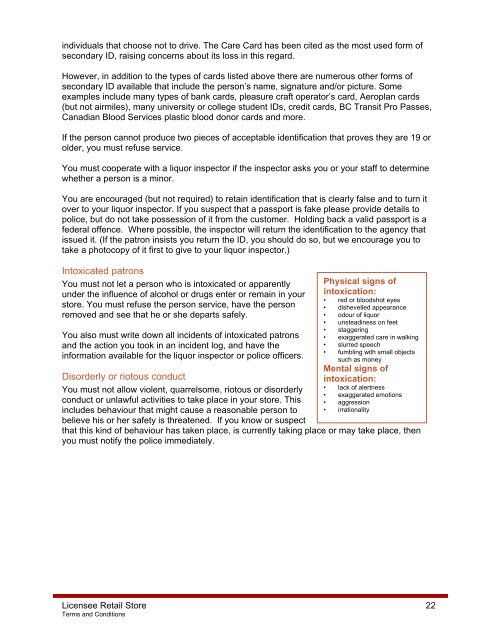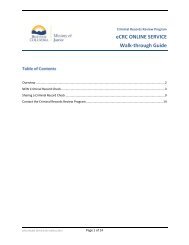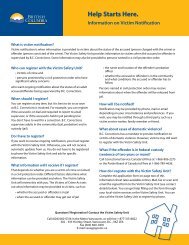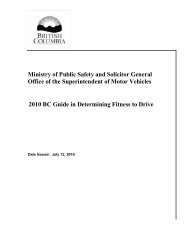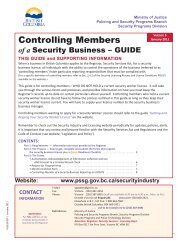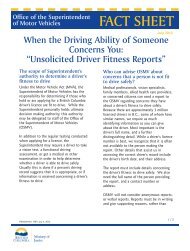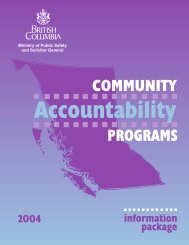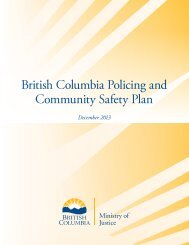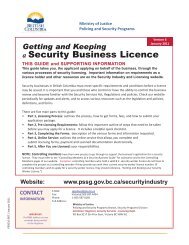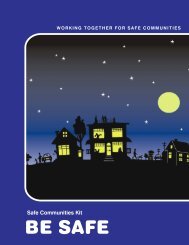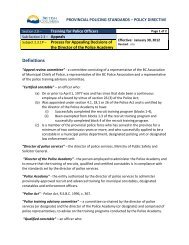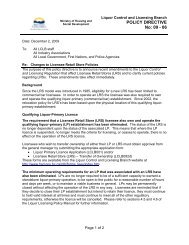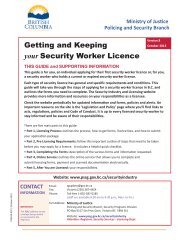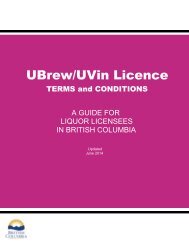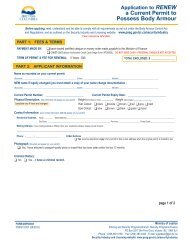Licensee Retail Store Licence Terms and Conditions guide
Licensee Retail Store Licence Terms and Conditions guide
Licensee Retail Store Licence Terms and Conditions guide
Create successful ePaper yourself
Turn your PDF publications into a flip-book with our unique Google optimized e-Paper software.
individuals that choose not to drive. The Care Card has been cited as the most used form of<br />
secondary ID, raising concerns about its loss in this regard.<br />
However, in addition to the types of cards listed above there are numerous other forms of<br />
secondary ID available that include the person’s name, signature <strong>and</strong>/or picture. Some<br />
examples include many types of bank cards, pleasure craft operator’s card, Aeroplan cards<br />
(but not airmiles), many university or college student IDs, credit cards, BC Transit Pro Passes,<br />
Canadian Blood Services plastic blood donor cards <strong>and</strong> more.<br />
If the person cannot produce two pieces of acceptable identification that proves they are 19 or<br />
older, you must refuse service.<br />
You must cooperate with a liquor inspector if the inspector asks you or your staff to determine<br />
whether a person is a minor.<br />
You are encouraged (but not required) to retain identification that is clearly false <strong>and</strong> to turn it<br />
over to your liquor inspector. If you suspect that a passport is fake please provide details to<br />
police, but do not take possession of it from the customer. Holding back a valid passport is a<br />
federal offence. Where possible, the inspector will return the identification to the agency that<br />
issued it. (If the patron insists you return the ID, you should do so, but we encourage you to<br />
take a photocopy of it first to give to your liquor inspector.)<br />
Intoxicated patrons<br />
You must not let a person who is intoxicated or apparently<br />
under the influence of alcohol or drugs enter or remain in your<br />
store. You must refuse the person service, have the person<br />
removed <strong>and</strong> see that he or she departs safely.<br />
You also must write down all incidents of intoxicated patrons<br />
<strong>and</strong> the action you took in an incident log, <strong>and</strong> have the<br />
information available for the liquor inspector or police officers.<br />
Disorderly or riotous conduct<br />
You must not allow violent, quarrelsome, riotous or disorderly<br />
conduct or unlawful activities to take place in your store. This<br />
includes behaviour that might cause a reasonable person to<br />
believe his or her safety is threatened. If you know or suspect<br />
Physical signs of<br />
intoxication:<br />
• red or bloodshot eyes<br />
• dishevelled appearance<br />
• odour of liquor<br />
• unsteadiness on feet<br />
• staggering<br />
• exaggerated care in walking<br />
• slurred speech<br />
• fumbling with small objects<br />
such as money<br />
Mental signs of<br />
intoxication:<br />
• lack of alertness<br />
• exaggerated emotions<br />
• aggression<br />
• irrationality<br />
that this kind of behaviour has taken place, is currently taking place or may take place, then<br />
you must notify the police immediately.<br />
<strong>Licensee</strong> <strong>Retail</strong> <strong>Store</strong> 22<br />
<strong>Terms</strong> <strong>and</strong> <strong>Conditions</strong>


